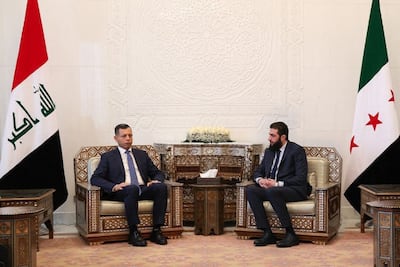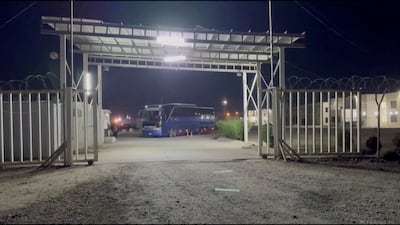Iraq’s main border crossing with Syria is expected to be reopened within days for travellers and goods, Iraqi officials told The National on Monday. It is a sign of a warming of ties between Baghdad and Damascus which have been cool since the interim government took power last month.
Al Qaim border crossing, in Anbar province about 400km west of Baghdad, was closed last month when Hayat Tahrir Al Sham-led Syrian rebels captured the Albukamal crossing on the Syrian side of eastern Deir Ezzor province. The move was part of a rapid offensive that ended with entry into Damascus and the toppling of Bashar Al Assad's regime.
“Al Qaim border crossing is ready and there are no problems from our side,” Turki Mohammad Khalaf, the mayor of Al Qaim border town, said. “We are ready at any moment to reopen it for both goods and travellers.”
The Syrian side has been working on rehabilitating the Albukamal crossing after it was vandalised during rebel military operations, he said. “We are expecting to be reopened in a week or so,” Mr Khalaf said.
A senior official with the Iraqi Border Points Commission said the Al Qaim border crossing will be reopened to traffic “within the coming days”.
Regional and western delegations have been flocking to Damascus where the interim government is trying to normalise relations with countries, particularly Syria's neighbours.
Iraq has cautiously welcomed the regime change in Syria and is calling for an inclusive political process. However, it has expressed concerns over the continuing situation in Syria, warning of the danger of a resurgent ISIS. Iraqi officials have warned that the numbers of extremist group's militants have increased and that they have seized more weapons.
Last month, Iraq sent a senior security delegation led by the Head of the Intelligence Service Hamid Al Shatri who met HTS leader and the Commander of Syria's new administration Ahmad Al Shara. They discussed several security-related issues, particularly the borders.

ISIS overran large parts of Iraq and Syria, in the summer of 2014, declaring a caliphate that took in large areas of both countries. During that time, it led a campaign of widespread and systematic abuses of international human rights and humanitarian law.
Iraqi troops, backed by a US-led international coalition, reclaimed all ISIS-held territory in Iraq in late 2017, after three years of fighting. However, ISIS fighters still carry out sporadic attacks, mainly in rural areas. The US has about 900 troops left in north-eastern Syria who have the responsibility of fighting ISIS.
HTS has been working on returning to the country to a sense of normality, urging Syrians abroad, some displaced for more than a decade, to return to their homeland. It also allowed former Syrian soldiers who served under Mr Al Assad's regime to reconcile their status with the interim government. More than 2,000 Syrian troops crossed into Iraq with their weapons and equipment last month, fleeing the rebel offensive. Baghdad later said it had begun returning them.
Life in Damascus has been steadily returning to normal. Schools have reopened and social services are being restored. Foreign embassies are also reopening. Damascus International Airport is scheduled to re-open on Tuesday.


